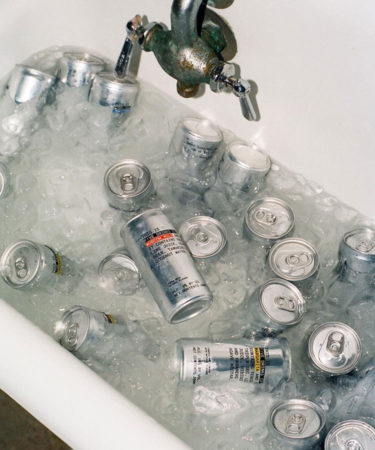Anheuser-Busch InBev’s former High End president Felipe Szpigel has found a new calling: canned cocktails. Szpigel, who left his position at AB InBev in January 2019, is now CEO of Five Drinks Co., a line of “ready-to-drink craft cocktails that don’t suck,” Szpigel told Brewbound.
Flavors include Moscow Mule, Margarita, and Gin & Tonic. The cocktails are not flavored malt beverages (FMBs), but are made with real spirits, and use five or fewer ingredients. They are also packaged in 6.8-ounce cans, rather than the usual 12-ounce format, to match the average size of a cocktail, Brewbound reports.
Four of Five Drinks’ co-founders have ties to AB InBev, including Szpigel; Jeremy and Chris Cox, co-founders of 10 Barrel Brewing; and Roberto Schuback, formerly of ZX Ventures. The fifth founder is Gustavo Sousa, formerly of marketing agency Mother. ZX Ventures holds a minority interest in the company, which is headquartered in Miami.
Five Drinks’ five founders cash in at least as many trends. Canned cocktails are on the rise — Nielsen reports a 40 percent sales increase in the category in 2018, with brands from AB InBev, Miller Coors, Constellation Brands, and craft producers in the mix. Cans in general are all the rage, in part because they’re more portable, affordable, and sustainable than other package formats. Health and wellness are having a moment, too, with imbibers turning to fresher ingredients, lower calories and carbs, and smaller formats for their drinks.
In short, the numbers are in Five Drinks’ favor.
Brewery Diversity Data Is Disheartening, but There Is Hope
Last week, the Brewers Association (BA) released the results of its Brewery Operations Benchmarking Survey, an optional survey of its members. The results include the “first benchmark of brewery owner and employee diversity, including both gender and race/ethnicity,” according to BA chief economist Bart Watson.
Unsurprisingly, the results indicate room for improvement. “The data show that similar to craft consumers, brewery employees are disproportionately white relative to both the general U.S. population and where breweries are located,” Watson writes.
A few insights:
- 88 percent of brewery owners are white, and 77 percent of owners are male
- 1 percent of brewery owners are black, and 4 percent of brewery employees overall are black
- 7.8 percent of production staff are Hispanic or Latinx; while 7 percent are American Indian or Alaskan Native; and 4.7 percent are African American or black
- 7.5 percent of breweries employ a female brewer
Overall, this is obviously disheartening. But the good news is, the BA and beer community at large are taking steps to make the beer industry a more inclusive and welcoming place. The BA created a Diversity Committee in 2017. In 2018, it launched a grant program that funds events from a diverse background of beer enthusiasts and businesses. In 2019, the BA published a five-part series of diversity best practices for breweries to use for their businesses.
At the same time, independently of the BA, black-owned and women-led businesses like Crowns & Hops and Harlem Hops are making a concerted effort to bring more people of color into the craft beer fold. Breweries around the world are employing adults with disabilities, and brewing initiatives like the Queer Brewing Project are giving LGBTQ beer lovers a voice.
Steps are being made. Hopefully, eventually, these efforts will lead to big-picture change.
More Breweries, More Problems (and Lawsuits)
Updates on several brewery lawsuits flooded in this week. Anheuser-Busch InBev’s Platform Beer Co., which AB InBev acquired earlier this month, is in a trademark dispute with Bottle Logic brewery over the two brands’ extremely similar logos.
CANarchy, which was sued by Guns ‘N’ Roses for trademark infringement over Oskar Blues Guns ‘N’ Rosé ale, has reached a settlement with the band. The lawsuit is expected to be dismissed.
Meanwhile, MillerCoors and Stone Brewing remain at a standstill regarding Stone suing MillerCoors over the larger brand labeling and marketing its Keystone beer as “Stone.”
Beer is a crowded business. As more brands enter the marketplace and seek new (or old) ways to capture consumers’ attention and cash, issues are bound to arise. In many cases, these trademark-related similarities are unintentional. In others, well, no one likes a copycat.
